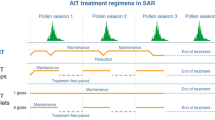Abstract
▴ This novel ultra-short-course seasonal allergy vaccine, containing glutaraldehyde-modified allergens and the adjuvants 3-deacylated monophosphoryl lipid A (MPL®) and L-tyrosine, requires a preseasonal course of only four injections to be effective in the treatment of seasonal allergic rhinitis.
▴ In patients with seasonal allergic rhinitis and/or allergic asthma, a four-injection vaccination course with either the grass pollen or tree pollen allergy vaccine significantly reduced skin prick sensitivity reactions, significantly elevated allergen-specific IgG levels and significantly reduced the seasonally induced boost of IgE.
▴ Preseasonal vaccination of adult patients with either grass pollen or tree pollen allergy vaccine significantly reduced the median combined symptom/ medication score compared with placebo.
▴ Similarly, preseasonal vaccination of children and adolescents with allergies to grass pollen or tree pollen significantly reduced the global symptom and medication use scores compared with the previous pollen season.
▴ Postmarketing surveillance indicated that after a course of vaccination, 82% of patients experienced reduced symptoms and 62% reduced their rescue medication use compared with the previous season.
▴ The allergy vaccine was generally well tolerated. Local reactions, mainly injection-site redness and swelling, were more common than systemic reactions. There were no serious adverse events.



Similar content being viewed by others
Notes
The use of trade names is for product identification purposes only and does not imply endorsement.
References
van Cauwenberge P, Bachert C, Passalacqua G, et al. Consensus statement on the treatment of allergic rhinitis. European Academy of Allergology and Clinical Immunology. Allergy 2000 Feb; 55(2): 116–34
Schädlich PK, Brecht JG. Economic evaluation of specific immunotherapy versus symptomatic treatment of allergic rhinitis in Germany. Pharmacoeconomics 2000 Jan; 17(1): 37–52
Plaut M, Valentine MD. Allergic rhinitis. N Engl J Med 2005 Nov 3; 353(18): 1934–44
Möller C, Dreborg S, Ferdousi HA, et al. Pollen immunotherapy reduces the development of asthma in children with seasonal rhinoconjunctivitis (the PAT-study). J Allergy Clin Immunol 2002 Feb; 109(2): 251–6
Hellman L, Carlsson M. Allergy vaccines: a review of developments. Clin Immunother 1996 Aug; 6: 130–42
Wheeler AW, Woroniecki SR. Allergy vaccines: new approaches to an old concept. Expert Opin Biol Ther 2004; 4(9): 1473–81
Till SJ, Francis JN, Nouri-Aria K, et al. Mechanisms of immunotherapy. J Allergy Clin Immunol 2004 Jun; 113(6): 1025–34
Akdis M, Blaser K, Akdis CA. T regulatory cells in allergy: novel concepts in the pathogenesis, prevention, and treatment of allergic diseases. J Allergy Clin Immunol 2005 Nov; 116(5): 961–8
Baldrick P, Richardson D, Wheeler AW, et al. Safety evaluation of a new allergy vaccine containing the adjuvant monophosphoryl lipid A (MPL®) for the treatment of grass pollen allergy. J Appl Toxicol 2004 Aug; 24(4): 261–8
Clay M, Urban E. Specific immunotherapy using pollen aller-goids adjuvanted with monophosphoryl lipid A over a three year period shows good efficacy and increased tolerability [abstract no. 4]. Clin Exp Allergy 2005; 35: 1411. Plus poster presented at the Annual Conference of the British Society for Allergy and Clinical Immunology; 2005 Jul 18–21; Loughborough, UK
Wheeler AW, Marshall JS, Ulrich JT. A Th1-inducing adjuvant, MPL®, enhances antibody profiles in experimental animals suggesting it has the potential to improve the efficacy of allergy vaccines. Int Arch Allergy Immunol 2001 Oct; 126(2): 135–9
Mothes N, Heinzkill M, Drachenberg KJ, et al. Allergen-specific immunotherapy with a monophosphoryl lipid A-adjuvanted vaccine: reduced seasonally boosted immunoglobulin E production and inhibition of basophil histamine release by therapy-induced blocking antibodies. Clin Exp Allergy 2003 Sep; 33(9): 1198–208
Baldrick P, Richardson D, Wheeler AW. Review of L-tyrosine confirming its safe human use as an adjuvant. J Appl Toxicol 2002; 22: 333–44
Drachenberg KJ, Wheeler AW, Stuebner P, et al. A well-tolerated grass pollen-specific allergy vaccine containing a novel adjuvant, monophosphoryl lipid A, reduces allergic symptoms after only four preseasonal injections. Allergy 2001 Jun; 56: 498–505
Drachenberg KJ, Heinzkill M, Urban E. Short-term immunotherapy with tree pollen allergoids and the adjuvant monophosphoryl lipid A: results from a multicentre, placebocontrolled, randomised, double-blind study [in German]. Al-lergologie 2002; 25(9): 466–74
Röver AC, Reimann S, Zuberbier T, et al. Immunophenotypic characterization of peripheral B cells during short-term immunotherapy with tree pollen allergoid and the immunoadjuvant monophosphoryl lipid A. J Invest Allergol Clin Immunol 2002; 12(4): 227–34
Drachenberg KJ, Heinzkill M, Urban E, et al. Efficacy and tolerability of short-term specific immunotherapy with pollen allergoids adjuvanted by monophosphoryl lipid A (MPL®) for children and adolescents. Allergol et Immunopathol 2003; 31(5): 270–7
Stuck BA, Schneider-Gene S, Schäfer D, et al. Short-term preseasonal immunotherapy with birch pollen allergoid plus monophosphoryl lipid A (MPL): influence of cytokine production of peripheral T cells in patients with allergic rhinitis. Allergy Clin Immunol Int - J World Allergy Org 2004; 16(2): 60–4
von Baehr V, Hermes A, von Baehr R, et al. Allergoid-specific T-cell reaction as a measure of the immunological response to specific immunotherapy (SIT) with a Thl-adjuvanted allergy vaccine. J Investig Allergol Clin Immunol 2005; 15(4): 234–41
Drachenberg KJ, Pröll S, Urban E, et al. Short-term immunotherapy using an allergy vaccine adjuvanted with monophosphoryl lipid A: a post-marketing surveillance study. Int Rev Allergol Clin Immunol 2002; 8(4): 219–23
Durham SR, Walker SM, Varga EM, et al. Long-term clinical efficacy of grass-pollen immunotherapy. N Engl J Med 1999 Aug 12; 341(7): 468–75
Author information
Authors and Affiliations
Corresponding author
Rights and permissions
About this article
Cite this article
McCormack, P.L., Wagstaff, A.J. Ultra-Short-Course Seasonal Allergy Vaccine (Pollinex® Quattro). Drugs 66, 931–938 (2006). https://doi.org/10.2165/00003495-200666070-00004
Published:
Issue Date:
DOI: https://doi.org/10.2165/00003495-200666070-00004




